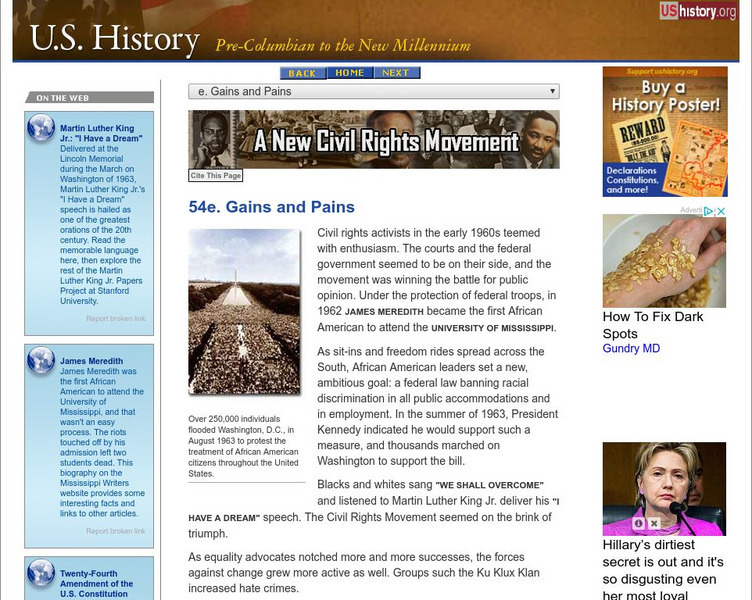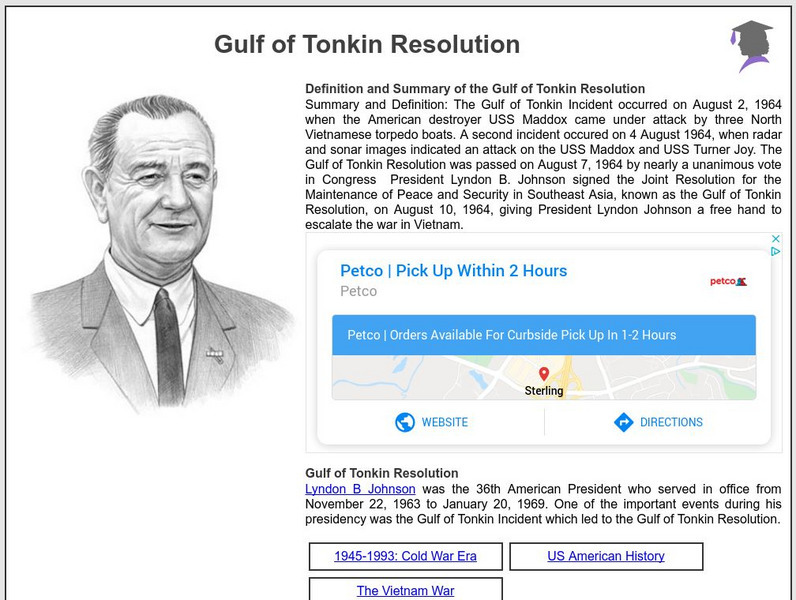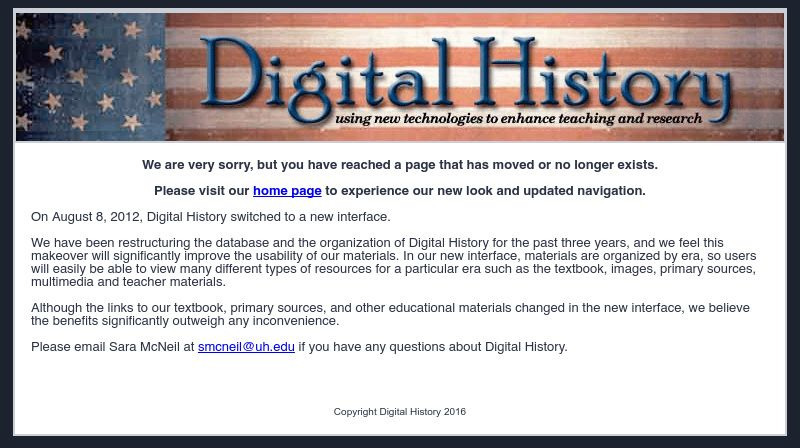Hi, what do you want to do?
Independence Hall Association
U.s. History: The Long, Hot Summer
The "long, hot summer" in reality spread over several years of summers in the mid-1960s. Read about the Watts riots in 1965, and the reasons behind racial upheaval in hundreds of American cities over the next three years.
Independence Hall Association
U.s. History: Gains and Pains
Read about the legal gains made by the civil rights movement, including the Civil Rights Act of 1964, juxtaposed against the real-life actions meant to deny African Americans their right to racial equality not just legally, but...
Curated OER
Wikipedia: Natl Historic Landmarks in Texas: Lyndon Baines Johnson Boyhood Home
Boyhood home of President Lyndon B. Johnson.
Ducksters
Ducksters: Civil Rights for Kids: Civil Rights Act of 1964
Kids learn about the history of the Civil Rights Act of 1964 including the background and work by leaders such as President John F. Kennedy, President Lyndon Johnson, and Martin Luther King, Jr on this site.
Smithsonian Institution
Nat'l Portrait Gallery: Ballyhoo! Poster as Portraiture: Goldwater for President
View Senator Barry Goldwater's presidential election poster and read the text that explains the poster.
Siteseen
Siteseen: American Historama: Great Society
Learn all about The Great Society that was the vision of President Lyndon Baines Johnson.
Siteseen
Siteseen: American Historama: Gulf of Tonkin Resolution
President Lyndon B. Johnson signed the Joint Resolution for the Maintenance of Peace and Security in Southeast Asia, known as the Gulf of Tonkin Resolution, on August 10, 1964, giving him a free hand to escalate the war in Vietnam.
National Geographic
National Geographic: The Impact of the Jfk Assassination on American Politics
Students investigate the impact John F. Kennedy's assassination has had on American politics since that event. After his death, Lyndon B. Johnson pushed through the Civil Rights Act of 1964 and the Voting Rights Act, both of which had...
American Presidency Project
American Presidency Project: Statement Following Receipt of a Report on Panama
This statement, read by Associate Press Secretary Andrew T. Hatcher during the presidency of Lyndon B. Johnson, was given following the receipt of information on the rioting and violence in the Panama Canal Zone in January 1964.
A&E Television
History.com: Assassination of John F. Kennedy
This is a unit about the assassination of JFK. President John F. Kennedy was assassinated on November 22, 1963 at 12:30 p.m. while riding in a motorcade in Dallas during a campaign visit. Kennedy's motorcade was turning past the Texas...
PBS
Pbs: American Experience: Address to Congress Following Kennedy's Assassination
Full text of the speech given by President Johnson after the assassination of John F. Kennedy. In his speech, he pledges to pursue Kennedy's legislative goals.
University of North Carolina
University of North Carolina: Vietnam War [Pdf]
A presentation covering the history of the Vietnam War beginning with the war for independence from France when it was a French colony. Covers the Geneva Accord and the war between the North and the South and how America became involved....
PBS
Wnet: Thirteen: Freedom: A History of Us: We Shall Overcome Webisode 15
Webisode 15 - We Shall Overcome. The history of the United States is presented in a series of webisodes, within each are a number of segments.Included are links to lesson plans, teacher guides, resources, activities, and tools.
Digital History
Digital History: The Age of Inflation
This site is a short article on inflation, but has a few prices of everyday goods from 1967 that might help in understanding inflation and how much prices have increased.
Independence Hall Association
U.s. History: Politics From Camelot to Watergate
A brief overview of the state of the United States between the election of 1960 and 1968. See how a nation full of enthusiasm and confidence could become so divided in eight short years.
My Hero Project
My Hero: Thurgood Marshall
Read about Thurgood Marshall's life and efforts as a fighter against segregation. This article includes related links and pictures.
The Atlantic Monthly Group
Atlantic Wire: Newly Released Secret Tapes
Newspaper article confirms that LBJ knew about Nixon's involvement in stalling the Vietnam peace talks and didn't bother to report it. Though the story has been around before, the new tapes describe how President Johnson knew all about...
Khan Academy
Khan Academy: The Civil Rights Act of 1964 and the Voting Rights Act of 1965
Read about the Civil Rights Act of 1964 and the Voting Rights Act of 1965 which sought to make discrimination illegal, and the resistance they faced from the public and government officials. As time passed, African Americans began to...
CommonLit
Common Lit: The Daisy Girl Ad
A learning module that begins with "The Daisy Girl Ad," accompanied by guided reading questions, assessment questions, and discussion questions. The text can be printed as a PDF or assigned online through free teacher and student...
Country Studies US
Country Studies: Kennedy and the New Frontier
This overview of President John F. Kennedy suggests that he set a liberal tone with his agenda rather than the more hands-on approach of his successor, Lyndon Johnson.
National Endowment for the Humanities
Neh: Edsit Ement: Jfk, Lbj, and the Fight for Equal Opportunity in the 1960s
In this lesson plan, students will consider "JFK, LBJ, and the Fight for Equal Opportunity in the 1960s." The plan includes worksheets and other student materials that can be found under the resource tab.
270 To Win
270towin: 1964 Presidential Election
Provides detailed electoral facts for the presidential election of 1964 won by Lyndon B. Johnson who successfully associated himself with President Kennedy's popularity.
Curated OER
John F. Kennedy
This overview of President John F. Kennedy suggests that he set a liberal tone with his agenda rather than the more hands-on approach of his successor, Lyndon Johnson.
PBS
Wnet: Thirteen: Rise and Fall of Jim Crow: A National Struggle: Congress
This two-page segment of a larger PBS site about Jim Crow discusses the role of Congress over close to 100 years in first entrenching Jim Crow laws in the law of the land, and eventually, through the Civil Rights Act of 1965 and the...



















